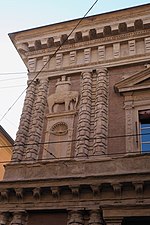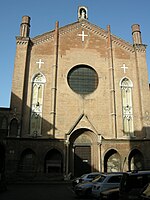Palazzo Poggi
Houses completed in 1560Palaces in BolognaUniversity of Bologna

The Palazzo Poggi is a palazzo in Via Zamboni 33, Bologna, Italy. It is the headquarters of the University of Bologna and of the rector of the university.
Excerpt from the Wikipedia article Palazzo Poggi (License: CC BY-SA 3.0, Authors, Images).Palazzo Poggi
Via Belmeloro, Bologna Irnerio
Geographical coordinates (GPS) Address Website Nearby Places Show on map
Geographical coordinates (GPS)
| Latitude | Longitude |
|---|---|
| N 44.496521 ° | E 11.351129 ° |
Address
Università di Bologna
Via Belmeloro
40126 Bologna, Irnerio
Emilia-Romagna, Italy
Open on Google Maps









